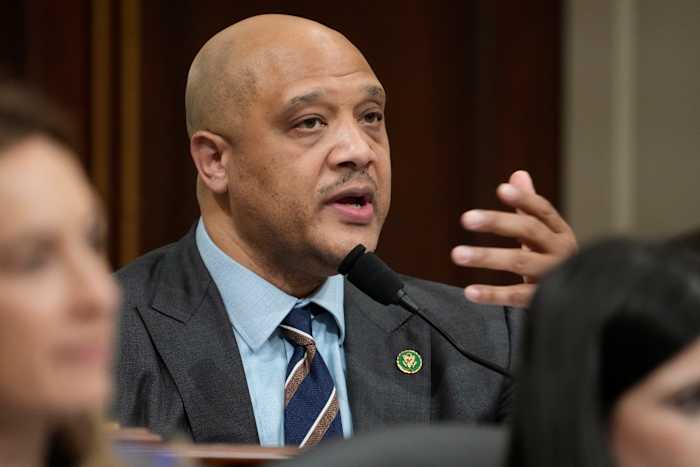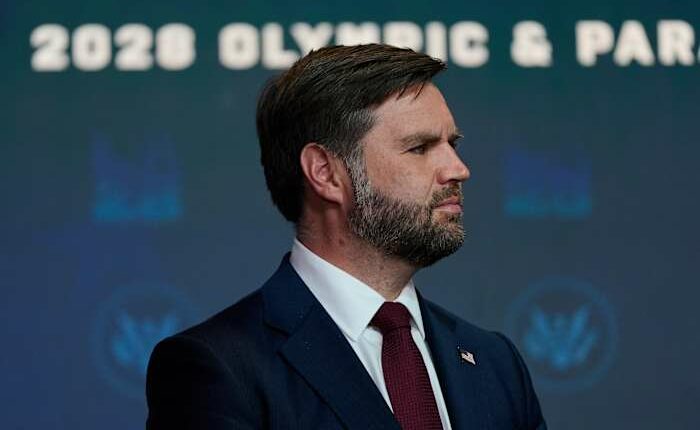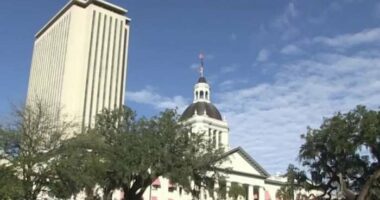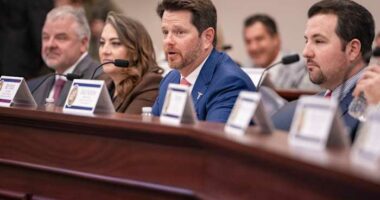Share this @internewscast.com

Vice President JD Vance visits Indiana on Thursday to discuss redistricting with Republican leaders as President Donald Trump intensifies efforts to persuade GOP states to reconfigure congressional districts, aiming to secure more favorable seats for the party in the 2026 midterm elections.
Vance has scheduled private discussions with Gov. Mike Braun and others before participating in a GOP fundraiser scheduled for Thursday night in the predominantly Republican state. On Tuesday, Braun informed reporters that he anticipates addressing various topics with the vice president, including redistricting, although no commitments have been established.
“It looks like it’s going to happen across many Republican states,” Braun said.
Vance’s visit follows a successful effort by Texas Democrats to block a vote this week on a reconfigured congressional map, part of an effort to gain five additional GOP-leaning congressional seats at the cost of Democrats prior to the midterms. The White House aims to facilitate Republicans in maintaining control of the House.
Although Indiana is firmly Republican, opponents of any redistricting efforts plan to express their objections on Thursday with protests and a press conference led by the state’s two Democratic congressional delegation members.
Braun would have to call a special session if he chooses to start the redistricting process, but lawmakers have the sole power to draw up new maps.
Braun’s office has not responded to multiple emailed requests seeking more details about Vance’s visit.
Republican U.S. representatives outnumber Democrats in Indiana 7-2, thus limiting the potential to gain another seat. Such an endeavor would almost certainly face legal challenges regarding its constitutionality.
Recently, Indiana lawmakers have been cautious of drawing national attention, particularly following a 2022 special session that resulted in the legislature enacting a stringent abortion ban. Braun remains a steadfast Trump ally in a state where the president holds a strong base of devoted supporters.
But Indiana is also home to Mike Pence, the former vice president and a past governor whose more measured approach to partisan politics still holds sway among many state lawmakers.
The GOP would likely target Indiana’s 1st Congressional District, a longtime Democratic stronghold that encompasses Gary and other cities near Chicago in the state’s northwest corner. The seat held by third-term Democratic U.S. Rep. Frank Mrvan has been seen as a possible pickup in recent years as manufacturing union jobs have left the area, said Laura Merrifield Wilson, a professor of political science at the University of Indianapolis.
Lawmakers in Indiana redrew the borders of the district to be slightly more favorable towards Republicans in the 2022 election, but did not entirely split it up. The new maps were not challenged in court after they were approved in 2021, not even by Democrats and allies who had opposed the changes that also gave a boost to the GOP in the suburbs north of Indianapolis.
Mrvan won reelection in 2022 by a respectable margin and easily retained his seat again in 2024. In a statement Tuesday, Mrvan said the Trump administration knows its policies are “wildly unpopular.”
“They know that their only hope to maintain control is to pressure the Indiana General Assembly to violate the Indiana Constitution and redistrict U.S. House of Representative(s) seats mid-decade,” he added.
The more dramatic option would be to zero in on Indiana’s 7th Congressional District, composed entirely of Marion County and the Democratic stronghold of Indianapolis.
Indiana’s legislative leaders, House Speaker Todd Huston and Senate President Pro Tem Rodric Bray, held their same positions four years ago when the Legislature finalized the new maps. Both expressed approval of the final product and said the borders fairly reflected the makeup of the state.
“I believe these maps reflect feedback from the public and will serve Hoosiers well for the next decade,” Bray said at the time.
Both leaders have been quiet on the possibility of a special session. Bray and Huston’s offices did not respond to multiple messages left over the phone and email Wednesday.
Republicans hold a supermajority in the Indiana House and Senate, meaning Democrats could not stop a special session by refusing to attend.
Julia Vaughn, director of Common Cause Indiana, said a costly redistricting process will not look good for Republicans who tightened the belt on the state budget this past legislative session due to revenue forecasts. Common Cause is one of the leading groups nationally opposing Trump’s push to redistrict.
“I don’t think there is any way they could rationalize spending taxpayer dollars to come back to Indianapolis to redraw maps that were just drawn four years ago for purely partisan purposes,” Vaughn said.
Copyright 2025 The Associated Press. All rights reserved. This material may not be published, broadcast, rewritten or redistributed without permission.











